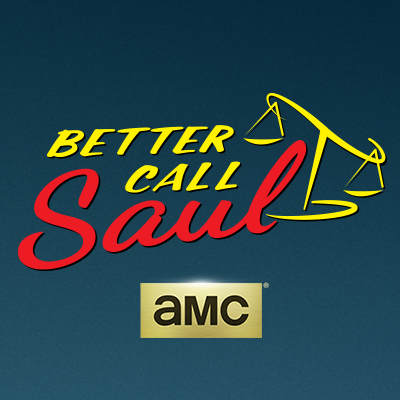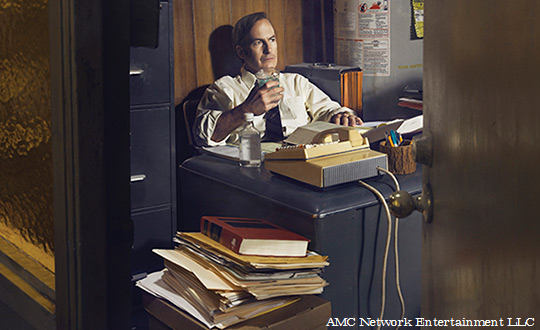 Sunday night’s premiere of Better Call Saul opened with the title character (a lawyer) working in a Cinnabon® (presumably part of witness protection), and then flashbacked to earlier days in his career (as a practicing attorney). Early in the episode, Saul travels to his “office” located in the water-heater closet of a nail salon. Before making his way through the salon, Saul asks the receptionist for his mail, and then proceeds to his “office” to sift through it. Thumbing through his mail, we notice that Saul uses the same address as the nail salon (no suite number or anything). While it’s yet to be seen whether or not Better Call Saul is a hit like its predecessor Breaking Bad, one thing is for certain: Saul’s fictional local search presence is in some trouble. Let’s talk about the concept of shared and virtual office space and why they don’t really work in today’s internet.
Sunday night’s premiere of Better Call Saul opened with the title character (a lawyer) working in a Cinnabon® (presumably part of witness protection), and then flashbacked to earlier days in his career (as a practicing attorney). Early in the episode, Saul travels to his “office” located in the water-heater closet of a nail salon. Before making his way through the salon, Saul asks the receptionist for his mail, and then proceeds to his “office” to sift through it. Thumbing through his mail, we notice that Saul uses the same address as the nail salon (no suite number or anything). While it’s yet to be seen whether or not Better Call Saul is a hit like its predecessor Breaking Bad, one thing is for certain: Saul’s fictional local search presence is in some trouble. Let’s talk about the concept of shared and virtual office space and why they don’t really work in today’s internet.
Before we start, let’s clarify that Saul doesn’t actually have a “virtual” office, but “shared” office space. While he does seemingly share an address with the nail salon, and (from the looks of his mail) doesn’t have a unique suite number, he technically does have a real office space where potential clients are able to meet with him (which puts him well within Google’s local search guidelines). However, because Saul shares his address with the nail salon, it could potentially create some confusion with his modern-day local search presence (i.e. not having a unique NAP these days is a MAJOR mistake
Because the episode is a flashback, let’s just say for the sake of simplicity that the events of the episode took place six years ago in 2009, which is more or less when local search began to mold itself into what it is today. Back then, Saul may have been able to rank with his address. Google was nowhere NEAR as strict as it is today when it comes to local addresses, so even without his own suite number, Saul could have “potentially” shown up in local search results. Heck, earlier in the episode, Saul even answers his cell phone as his office phone, which is definitely not recommended by Google these days, but even THAT tactic would have worked way back then.
If Saul were a real lawyer in 2015, having a shared office space in the back of a local business wouldn’t necessarily cut it (and unless he has a forwarding phone number, using his cell phone as his main office line wouldn’t be a good idea either). It’s a similar situation to the virtual office space debate that a lot of lawyers these days still argue in favor of. Virtual office space has been officially banned by Google per its most recent Google My Business guidelines. If you want your business to rank locally, you need to have a unique address that is officially registered with the U.S. Postal Service as belonging to YOUR business. If you’re a lawyer, this address should also be on file with your state bar association, and you should probably sign up with the Better Business Bureau to help solidify the address as real.
Ultimately though, the SINGLE MOST IMPORTANT aspect of your address is that it’s a real, brick-and-mortar location that is staffed during stated business hours. If you’re an attorney and you’re not doing the above, you’re not doing local right (and you’re probably not ranking very well locally as a result).
Many attorneys like to use to virtual office space because they think that it helps them rank locally in more cities than just the one where their primary office address is located. This certainly USED TO be the case, but it simply isn’t anymore. So, unless you’re like Saul and you’re actually operating out of your office during stated business hours, you’re not going to have much luck ranking locally (NOTE: black hat tactics may still work from time to time, but bending the rules is NEVER worth it given the severe penalties your website can suffer as a result). While Saul may definitely need a unique suite number to help avoid confusion with the nail salon, at the very least he seems to be following all the other rules and could potentially rank in today’s “Google-run” local search scene.
Only time will tell whether or not Better Call Saul is a hit, but one thing that’s definitely certain is that trying to pull a fast one on Google is never a good idea. Google’s local search algorithm is incredibly sophisticated compared to what it was six years ago, and virtual office space just doesn’t fit the local business criteria anymore. If you’re still using virtual offices in your internet marketing campaign, you run the risk of Google throwing the book at you, at which point you might actually have to Call Saul to help you defend yourself! (What? Too much?)
If you have questions about the Do’s and Don’ts of local search, you can always contact the local search marketing team at SLS Consulting. We keep close tabs on the latest happenings in the world of local search, and can steer you clear of tempting black hat tactics. While following Google’s rules might not always be the most appealing option, it’s certainly the safest, and the one that’s going to get you better local search rankings in the long haul.
In need of local search help? Better Call SLS! (Not “technically” another reference, but more of a shameless plug.)
Categories:
- Ask SLS
- Bail Bonds
- Client-Focused Strategy
- Community
- Google My Business
- Google Updates
- Holidays and Other Fun Stuff
- Law Firm Management
- Legal Online Marketing
- Local Search
- Marketing Tips
- Ms. White Hat’s SEO Corner
- Online Brand Development
- Online Content Development
- Online Review Sites
- Search Engine Optimization
- SLS News
- Social Media Marketing
- Video Marketing
- Website Design
